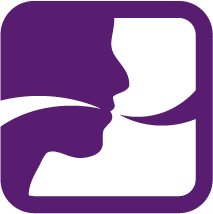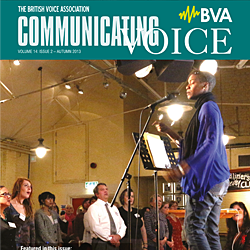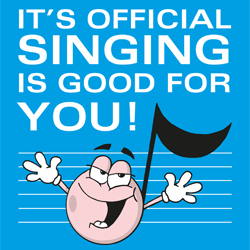About the Association
Archived newsletter articles
Performance Breath - An Essential Exploration of Body, Voice and Word
4th & 5th January 2007, Royal Academy of Dramatic Art (RADA), London, in Association VASTA
British Voice Association event report – by Lynne Wayman
The Conference was held at the Vanbrugh Theatre, Malet Street with additional workshops at Chenies Street a short walk away allowing time to reflect and take in some fresh air. Prior to the Conference delegates had the opportunity to choose three workshop options from a total of fourteen, these sessions were interspersed with two keynote speeches, three presentations and three panel discussions.
The friendship between Jane Boston (Head of Artistic Research and Development, RADA) and Rena Cook (Head of Voice, University of Oklahoma School of Drama, serving on VASTA Board of Directors) had lead to their collaboration on this project inviting practitioners and medics to build an esoteric yet practical bridge between mind and body; breath being the vehicle, both actual and metaphysical, for change. In this context, Jane quoted from Shelley's Ode to the West Wind – .O Wild West wind, thou breath of Autumn's being...'.
The first of two keynote speeches was given by Catherine Fitzmaurice (Professor of Theatre, University of Delaware, and Alumna and Former Voice and Text Teacher. Central School of Speech and Drama) entitled Reflective Breathing and Structured Breathing – Discerning and Utilizing Rhythms of Spontaneity and Choice. She saw herself as a trainer not a scientist, working in various ways to meet individual needs, giving direction not instruction. A distinction was made between survival and intentioned breath with health being compromised when the former was held or hindered.
Wilhelm Reich was acknowledged as an important influence on her work, here the 'tremor' or Involuntary Destructuring was mentioned as a route to release a technique embodied in Yoga, Shiastu, Reiki and Eastern Holistic Traditions.
Given such a wealth of choice for Workshops I'm sure we all felt torn when choosing only three but, as a singer and singing teacher, I'm drawn towards experiential learning so I opted to quench my curiosity by joining the Fitzmaurice workshop in order to 'embody' the techniques for myself.
As one would expect from such an experienced practitioner our large group was immediately put at ease with an invitation to take part in release work, centering inwards, doing the exercises mindfully until we experienced the 'tremor'. After each section we gave feedback both physical and emotional. I found this 'taster' session drew together strands from both Yoga and Feldenkrais, it has encouraged me to want to read more.
During conversations with delegates prior to the Conference several mentioned that they had heard of the Accent Method but weren't sure what it was! This was addressed when Sara Harris (Specialist Speech and Language Therapist, Team member, The Voice Clinic, London) gave a succinct explanation of the Method i.e. history, principles and how to set up the technique – all included in the delegate file. This was followed by a demonstration where Dinah Harris (Freelance Singing Teacher and Vocal Coach) led Sara through a series of exercises accompanied by drumming on bongos.
I have a biased view as I have used these techniques successfully with my pupils needing vocal rehabilitation but this presentation was interesting as it highlighted the difference in approach between Fitzmaurice and Accent Method – all fuel for debate.
After a delicious lunch we returned to the Vanbrugh Theatre where Dr Yolanda Herman-Ackah (Assistant Professor, Dept of Otolaryngology, Thomas Jefferson University, Philadelphia) gave a presentation on the Physiology and Mechanics of Voice Production beginning with an anatomical explanation. Some delegates found her delivery too fast and the content somewhat basic given the experience of the audience. She stressed, with very clear diagrams, the importance of utilizing the back muscles but it was suggested that her view that more flow made the voice louder was an oversimplification – again a debatable point.
My second workshop choice was with physical therapists Ed Blake and Jane Grey, Ultrasound Imaging of the Abdominal Support Mechanisms whilst Voicing. This technique, which has no side effects, allows the therapist to see poor muscle patterns and observe how they can be accurately retrained. The work is focused on the entertainment industry particularly Musical Theatre where manual techniques help to restore the mechanism quickly. Ed explained the work of the abdominal muscles and with the aid of an excellent presentation described the problems that occur when these are over or under used. I was particularly interested in the process that leads to muscular tension dysphonia.
We were invited to be scanned and two amazing physical specimens volunteered, as they were both well in control of their musculature Jane gave us a demonstration of 'what goes wrong' so we could observer this on screen, how it is rectified and how these 'cues' can be taken home by the performer and repeated. Ed then gave a demonstration of the technique of manual manipulation of the larynx. Often speed of recovery is paramount for the performer, a quick fix, which maybe the nature of the industry but Ed stressed the importance of treating the whole person and not just the local site.
After such a stimulating day it was good to relax in the bar and, much to several female delegates delight, Alan Rickman shared with us his memories of RADA.
Friday began with an optional movement class led by Jackie Matthews (Head of Movement, RADA) followed by the second Keynote speech, a fascinating insight into the work of Rocco Dal Vera (Professor, University of Cincinati) on the relationship between breathing and emotion in actors. This was high level work most suited to actors of experience, allowing them to communicate strong emotions and complex meaning without compromising their vocal and emotional health.
Our next speaker lamented 'the profound ignorance of the medical profession regarding voice, singing and performance'. Dr. John Costello (Consultant, King's College Hospital, London) gave a physicians explanation of how lung diseases can profoundly affect vocal effectiveness. With a gentle manner, filled with humour and humanity, we were guided through the anatomical details of how the mechanism works and what goes wrong.
Imagery, Impulse and Involuntary Breathing Musculature given by Kristin Linklater (Head of Acting, Columbia University) was my 3rd Workshop choice. Linklater guided the large group in some of the ways she uses to free the natural voice though, she stressed, this was not how she taught! In her introduction she explained that these exercises helped the student to achieve physical awareness i.e. experiencing the 'touch of sound' and vibration, stimulating the resonators, engaging the musculature and developing lung capacity. Working with imagery and imagination can help the student to achieve the involuntary function of breathing. There was a constant discourse through these exercises as the group were invited to stop in order to talk through the 'why' sharing questions and experience. Progressing through sighing to voicing and eventually singing the sound, to me, became more sonorous.
Observing this inspirational teacher working at speed and in such depth gave me time to consolidate my thinking. Her thanks to the group for their responsiveness reflected her generous and gracious nature.
Discursive – proceeding by argument or reason rather than by intuition
During these Discursive workshops we were asked to consider how the interdisciplinary approach to breath, the body and the voice had advanced our thinking.
Here is a summery of the feedback from the eloquent and, at times, passionate panel.
- Integrated voice work - physical, mental and emotional to help free creativity.
- Interdepartmental integration of Drama, Dance and Music in schools and colleges
- Student centred learning - voice work targeted to each individual's journey
- Actors and singers trained in the same way
- Teaching of fundamental anatomy encouraged
- Concerns at lack of audibility
- Science is quantifiable but goes hand in hand with instinct and nature.
- The journey is fundamental - concentrate on the 'process' – experience later
All food for thought...
Bardy Thomas (Dean of Studies, RADA) chaired the final panel discussion: Breath and Reaction in the Body with Kristin Linklater, David Carey, Patsy Rodenburg OBE (former Head of Voice, National Theatre, London and Head of Voice at Guildhall School of Music and Drama) and Lorna Marshall (researcher/teacher of creative process for performers, Honorary Research Fellow, RADA and Visiting Professor, New National Theatre, Tokyo).
They considered voice to be a journey of awareness within the body, during the process there could be disagreement in approach but the work was towards the same end crossing cultures and disciplines but ultimately finding common ground.
There was agreement that change within a student needed to be negotiated, if it was imposed then there would be resistance. Change could be construed as obedience; repetition of exercises perceived as conformity, working against creativity. If we ask someone to change inappropriately it will be perceived as life threatening and their reaction will be stubbornness.
Some inspiring quotes related to Shakespeare: "He brings together human response in total" and "makes us better than we want to be, he likes humanity which is why he connects over the centuries because we breathe", as Shakespeare wrote.
As I draw the threads together from speeches, presentations, discussions and workshops there seems to be a dichotomy between urbanisation and society today as opposed to the voice as our life's journey. Is the industry working to the detriment of a performers balance in body, psyche and emotion that, in turn, inspires the breath I wonder.
The Conference came to an end with thanks to VASTA for co-sponsoring and David Carey for his help in organising and representing the BVA.
Appropriately 'Performance Breath' closed with 'Ode to the West Wind' – Percy Bysshe Shelly, recited by 2nd year student Tomiwa Edun.
More archived content online
Disclaimer
Neither the British Voice Association nor the Editor can be held responsible for errors or any consequences arising from the use of information contained in its newsletters (or extracts from its newsletters published online); the views and opinions expressed do not necessarily reflect those of the British Voice Association (BVA) or the Editor, neither does the publication of advertisements constitute any endorsement by the BVA or Editor of any products or services featured.

 Join us Now!
Join us Now! our newsletter
our newsletter free voice care leaflets & information – download here
free voice care leaflets & information – download here Help our work by donating while you shop
Help our work by donating while you shop